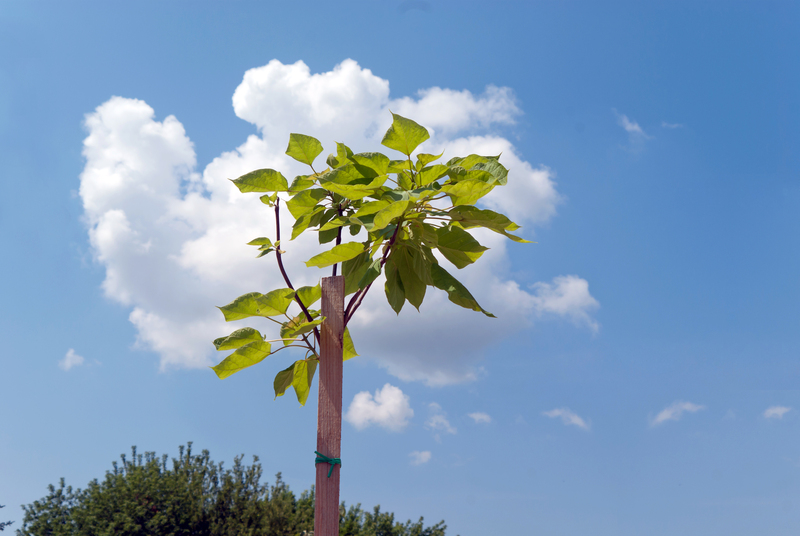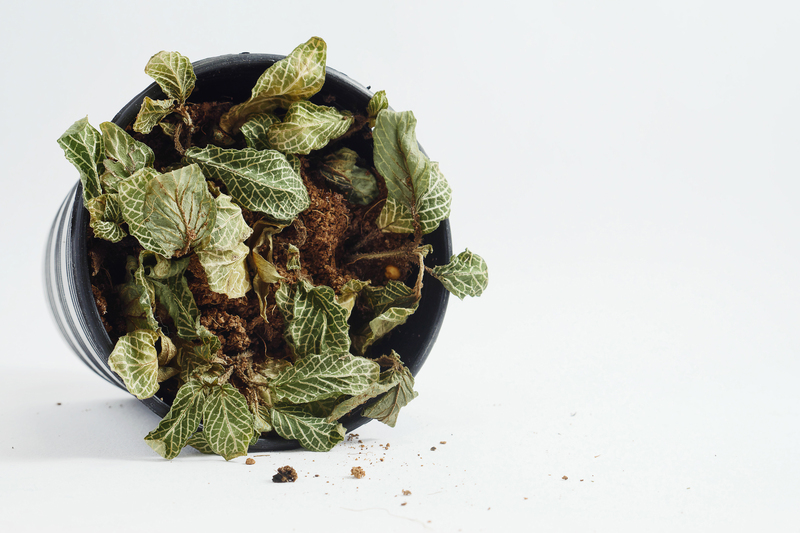Expert Tips for Winterizing Your Garden for Optimal Protection
Posted on 12/06/2025
Expert Tips for Winterizing Your Garden for Optimal Protection
As the days grow shorter and temperatures begin to drop, it's time to start thinking about how to protect your cherished outdoor space from the harsh winter months. Winterizing your garden is a crucial step that ensures your plants and soil survive the cold and are ready to thrive come spring. In this comprehensive guide, you'll find top horticulturists' advice, practical tasks, and eco-friendly strategies for winterizing your garden for optimal protection.
Why Winterizing Your Garden Matters
Many gardeners overlook the importance of preparing their gardens for winter. However, proper winterization minimizes damage caused by frost, snow, ice, and fluctuating temperatures. It also deters pests and diseases, keeps perennials strong, and even sets you up for a better growing season next year. Winter garden protection is an investment in your garden's health and aesthetics.
Key Benefits of Protecting Your Garden in Winter
- Reduces plant loss from cold, wind, and ice.
- Minimizes pest infestations and disease spread over winter.
- Preserves soil health and structure for spring planting.
- Keeps perennials healthy and encourages robust regrowth.
- Prepares hardscaping and equipment for durability and longevity.

Step-by-Step Guide to Winterizing Your Garden
The tasks involved in winterizing your garden for optimal protection vary depending on climate, plant types, and garden design. However, the following expert tips provide a comprehensive approach that can be adapted to any garden.
1. Clean Up the Garden Beds
Begin by removing dead annuals, spent vegetables, and weeds from your garden beds. By clearing debris, you:
- Eliminate overwintering sites for insects and plant diseases.
- Enhance air circulation, which reduces mold and rot.
- Improve the aesthetics of your winter landscape.
But don't be too tidy! Some seed heads (such as coneflowers or sunflowers) provide food for birds during the cold months. Leave select plants standing for wildlife and winter interest.
2. Mulch for Insulation
Mulching is one of the top winter garden protection tips. A thick layer of mulch acts as a blanket, stabilizing soil temperature and moisture and preventing freeze-thaw cycles that can damage plant roots. Use organic mulch options such as:
- Shredded leaves
- Compost
- Straw or pine needles
- Wood chips or bark
Apply 2-4 inches of mulch around the base of perennials, trees, and shrubs. Keep mulch a few inches away from trunks or stems to prevent rot.
3. Protect Perennials and Tender Plants
Certain perennials and tender bulbs (like dahlias and cannas) need extra protection:
- Cut back spent perennials to a few inches above the ground to reduce disease risk, unless they're being left for winter interest.
- Lift and store tender bulbs indoors in a cool, dry place.
- For borderline-hardy perennials, cover them with extra mulch or evergreen boughs to insulate from extreme cold.
4. Safeguard Trees and Shrubs
Young trees and shrubs, especially evergreens, are vulnerable to winter damage. Harsh winds, heavy snow, and sunscald can stress or kill plants. Take these preventive measures:
- Water thoroughly before the ground freezes to prevent winter desiccation.
- Wrap trunks of young or thin-barked trees with tree wrap or burlap to protect from sunscald and animal damage.
- Shield evergreens with windbreaks of burlap if exposed to drying winter winds.
- Brush off heavy snow after storms to avoid limb breakage. Avoid shaking ice-laden branches, as this can cause more harm than good.
5. Take Care of Lawns
Your lawn also needs attention as winter approaches. Follow these steps for winter lawn care:
- Rake leaves to prevent smothering the grass and the spread of disease.
- Mow a final time with the blade set higher than usual to promote healthy roots.
- Aerate and fertilize in late fall to reduce thatch and enrich the soil for spring.
6. Prepare Raised Beds and Containers
Raised beds and containers freeze more easily than ground-level plantings. To winterize your raised beds and potted plants:
- Add extra mulch or straw over soil and crowns of overwintering plants.
- Wrap or insulate pots with bubble wrap, burlap, or move them to a sheltered location.
- Empty and clean out containers that won't be used in winter to avoid cracking and mold.
7. Protect Your Garden Tools and Equipment
Garden tool maintenance is often overlooked in garden winterization. Properly cleaning and storing your tools now extends their life and gets you off to a great start in spring:
- Clean dirt and sap from all spades, pruners, and other tools.
- Sharpen and oil blades to prevent rust.
- Store hoses and irrigation equipment drained and coiled in a frost-free place.
- Winterize gas-powered equipment (mowers, trimmers) for safe storage.
Eco-Friendly Tips for Winterizing Your Garden
Embracing sustainable gardening practices helps protect your local ecosystem while preparing your garden for winter. Here are a few eco-friendly strategies:
- Compost garden debris like leaves, trimmings, and spent annuals to create rich, organic material for spring.
- Leave some organic litter (such as leaf piles and stems) to provide habitat for beneficial insects, birds, and pollinators.
- Reduce the use of chemicals and synthetic fertilizers before winter to prevent groundwater pollution.
- Consider planting cover crops to fix nitrogen, prevent soil erosion, and improve soil structure over winter.
Best Cover Crops for Winter Protection
- Winter rye
- Clover
- Vetch
- Field peas
Simply sow the seeds in late fall; these fast-growing plants cover bare soil, suppress weeds, and return nutrients when tilled under in spring.
Common Mistakes to Avoid When Winterizing Your Garden
Even seasoned gardeners can overlook some key steps in winterizing their gardens for maximum protection. Be sure to avoid these pitfalls:
- Applying mulch too early - Wait until after the ground freezes so you don't trap pests in the soil.
- Over-pruning trees and shrubs - Prune only dead or diseased limbs; major pruning stimulates growth at the wrong time.
- Watering too little before freeze-up - Dry roots are more vulnerable to winter kill. Water deeply in late fall.
- Neglecting tool cleanup - Dirty, rusty tools spread diseases and break down faster.
Special Considerations for Flower and Vegetable Gardens
How To Winterize Flower Beds
- Cut back dead foliage on perennials, leaving some for visual interest and wildlife.
- Plant spring-flowering bulbs (like tulips, daffodils, and hyacinths) before the ground freezes.
- Lift, divide, or store tender bulbs such as gladiolus and dahlias.
- Mulch beds heavily after the first hard frost for insulation.
Vegetable Garden Winterization
- Harvest final crops and remove spent plants to avoid pest habitats.
- Add compost, manure, or a cover crop to replenish soil nutrients.
- Deep mulch garlic, onions, and overwintering vegetables for continued protection.
- Clean and store stakes, cages, and excess equipment.
Winterizing Ornamental and Fruit Trees
Fruit and ornamental trees benefit from extra attention:
- Remove mummified fruit and dead branches to reduce disease risk.
- Add compost and mulch around drip lines for nutrient boost and frost protection.
- Guard trunks against rodents with mesh or plastic guards.
Frequently Asked Questions (FAQ) About Garden Winterization
When is the best time to start winterizing your garden?
Begin the winter garden preparation process in late fall, after the first few frosts but before the ground freezes completely. This timeline allows you to remove debris, mulch, and water deeply while temperatures are still manageable.
Do all plants need to be covered or protected?
No, some hardy perennials and shrubs are well-adapted to winter conditions. Focus extra protection on newly planted, rare, or borderline-hardy species, and those known to be susceptible to freeze damage.
How much should I water before winter?
In general, give all trees, shrubs, and perennials a deep watering before the soil freezes, especially evergreens. This reduces desiccation and stress during the winter.
Can I fertilize my garden before winter?
Avoid high-nitrogen fertilizers in late fall, as these can stimulate new growth that will be damaged by cold. Mulch, compost, or aged manure are better options for winter soil enrichment.

Final Thoughts: Ensuring Optimal Garden Protection Over Winter
Winterizing your garden for optimal protection is about much more than taking a few preventive steps--it's an act of stewardship and forward-thinking planning. By following these expert guidelines, you're not only preserving your landscape assets but also enriching the soil, supporting wildlife, and creating a foundation for healthy, lush growth in the coming year.
Take the time this season to implement these winter garden protection strategies and you'll be rewarded with a flourishing garden when spring returns!
Summary of Winterizing Your Garden for Optimal Protection
- Clean up debris and diseased material from garden beds
- Mulch deeply for insulation
- Protect tender perennials, bulbs, trees, and shrubs
- Winterize lawns and raised beds
- Care for tools and garden equipment
- Adopt eco-friendly practices and plant cover crops
- Avoid common mistakes that can lead to winter damage
- Plan for spring with smart gardening strategies
With the right preparation, your garden will weather the winter beautifully and burst into vibrant life when warmer days return.
Latest Posts
Garden Success: Strategies to Handle Excessive Wind
Create a serene Zen garden to soothe your senses
Unveiling Effective Ways to Guard Your Garden Against Harsh Weather

